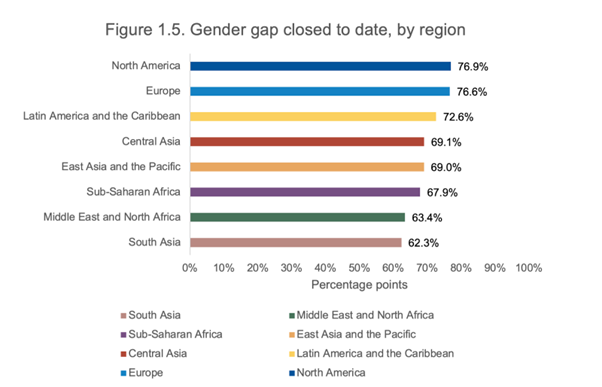how can e-Residency empower women entrepreneurs?
Women are greatly underrepresented in entrepreneurship despite adding immense value. How can e-Residency encourage more female entrepreneurs?

There is growing evidence that gender diversity in business is both economically and socially beneficial. Closing the gender gap and encouraging more women entrepreneurs could promote economic growth, boost household revenue streams, support financial independence, and bring new ideas and experiences to the table.
Yet globally women own only a third of formal small and medium enterprises (SMEs), according to World Bank data. The share of female entrepreneurs also tends to be lower for company directors and sole proprietors. Women entrepreneurs are greatly underrepresented in the e-Residency community too. Only 16% of new e-residents are women. They clearly represent a large untapped population of entrepreneurs for the programme.
So, why are there not more female entrepreneurs? And how can e-Residency empower more women to take up entrepreneurship?
Women across the world face many barriers to entrepreneurship. A major challenge for women entrepreneurs globally relates to accessing finance. The exact causes of this vary across different regions, countries and societies. Some common causes include regulatory discrimination, attitudinal biases, and a lack of self confidence. Tackling these issues and so reducing the constraints women experience when seeking out finance could help level the playing field and open up more opportunities in entrepreneurship.
Why does boosting women entrepreneurs matter?
- Diversity in entrepreneurship promotes economic growth and corporate profitability
McKinsey estimates that narrowing the gender gap could add USD12 trillion in GDP to the global economy by 2025. Improving opportunities for women worldwide should be a priority for all policymakers and decision makers in the public, private and social spheres. As the report says, gender inequality "is not only a pressing moral and social issue but also a critical economic challenge. If women—who account for half the world’s population—do not achieve their full economic potential, the global economy will suffer". Just look at Afghanistan where, 12 months after the Taliban took over, the economy has lost $5 billion and reversed ten years of economic growth. A UNDP report suggests that restricting women from work in Afghanistan could result in a economic losses up to $1 billion or 5% of the country's GDP.
There is also a business case for gender diversity in corporate leadership, affirms McKinsey in a separate study. Their research showed that companies in the top quartile for gender diversity on executive teams were 25 percent more likely to have above-average profitability than companies in the fourth quartile. Another study by Harvard Business Review found that firms with more women in the C-suite are more profitable. These studies provide practical evidence that women-owned and -managed businesses perform well for shareholders and ultimately the economy.
- Women entrepreneurs can provide an alternative household revenue source or become financial independent
Women make up half the world’s population, yet often are not able to participate in the formal economy, seek a wage through employment, or reach their full earnings potential. Allowing women to do so provides financial independence. For women in families, it can also increase household income. One way is to empower women to take up entrepreneurship.
On its blog, the World Bank notes: “In lower income countries, working as an employee is the exception, not the norm for men and women. Only 7% of women ages 15 and up are employed as wage workers in low-income countries, compared to 18% of men (this includes public and private sector jobs as employees, formal and informal)."
It’s not just low-income countries where women are affected. The figure below shows the gender gap by region. The gender wage gap is the difference between median earnings of men and women relative to median earnings of men. Wage equality increased marginally for women in 2022 but it will still take 151 years to close the global gender gap in women’s economic opportunity and attainment.

The World Bank again: “Female entrepreneurship (and self-employment, in general)—working without a boss, be it in micro, small, medium, and large enterprises—consequently becomes an important vehicle for women’s empowerment.”
In addition, many women are already entrepreneurs despite not being counted in official statistics. In some countries, it’s women who overwhelmingly participate in the domestic informal economy - as unpaid carers, maids, cleaners, shopkeepers and nannies. For example, in South Africa the informal sector is significant. Over 2.5 million people make up 20% of total employment in the country and contribute to about 5.1% of the country's GDP.
Fifi Matlatse, a location-independent entrepreneur from South Africa, runs her company out of Estonia as an e-resident. She is the founder of FiFi M advisory, a data protection and privacy strategy consulting firm. Matlatse originally became an e-resident to manage her business while travelling. She even spent time in Estonia on the digital nomad visa. She attributes her entrepreneurial mindset partly to South Africa's informal economy culture:
“The entrepreneurial spirit has been in me from a very young age because my father was an entrepreneur and I used to 'help' him in his tuckshop. I started my own 'entrepreneurial' journey in primary school where I would buy sweets from the supermarket and secretly sell them at school for a little bit of extra cash. I come from a country with a large number of informal businesses, so informal entrepreneurship drives the economy and it is mostly women running these businesses.”
Read more about Fifi and her journey here.
- Women bring diverse ideas, approaches and experiences to entrepreneurship
A growing body of evidence shows that organizations with a higher percentage of women in leadership roles lead to more innovation. People with different backgrounds and experiences often see the same problem from a new perspective and come up with alternative solutions. This increases the odds that one of those solutions will be a hit. In a fast-changing business environment, such responsiveness leaves companies better positioned to adapt.
Research from the Harvard Business Review found that women score higher than men in 17 out of 19 key leadership skills, including “taking initiative, acting with resilience, practising self-development, driving for results, and displaying high integrity and honesty”. It is thus important to encourage female entrepreneurs to step forward and allow their skills to be put to productive and powerful use.
What are the barriers to overcome the disparity of women entrepreneurs?
According to the World Bank, “women face time, human, physical, and social constraints that limit their ability to grow their businesses.” These types of systemic barriers are widespread and relate to discriminatory laws and structures, lack of education or access to technology, social norms, and attitudinal biases. They vary in size, strength and prevalence across regions, countries and societies. For example, “only 38 out of 141 economies covered in the World Bank’s Women, Business and the Law database set out equal legal rights for women and men in key areas such as opening a bank account, getting a job without permission from their spouse, and owning and managing property.”
In this article, we'll hone in one barrier that is ubiquitous: access to finance.
Accessing capital or finance is a huge barrier for any woman seeking to start or grow their business. Access to finance and “financial exclusion pose a great challenge, especially for women entrepreneurs as they try to access capital to start, operate, and/or expand their businesses." Recent estimates by the International Finance Corporation suggest that women entrepreneurs worldwide face $1.5 trillion worth of financing deficits.
The investment gap is also clear in startup funding. For example, according to an analysis of startup investment data in the US, investments in companies founded or cofounded by women averaged less than half that invested in companies founded by men. Over time however, the startups founded or cofounded by women actually performed better, generating about 10% more revenue in a five year period. That translates to a better financial bet for the investors by far! But I digress.
It's not just women-led startups that struggle. Scaling a sustainable business can also be difficult if there are systemic or social barriers in the way. Invisible barriers like unconscious bias hinder women from business potential.

Despite progress, studies show about 90 percent of men and women alike hold some sort of bias against women in the workplace. As Matlatse has found, “I cannot tell you the number of times I'm addressed as a 'Sir' or 'Mr'. Before meeting me, people assume that I am a man. This doesn’t bother me per se, however it shows just how far we still have to go to close the gender gap and give women the respect they deserve as entrepreneurs.”
Women founders currently face serious challenges in accessing venture capital at all stages of a company's life cycle. Perhaps it is no surprise when, according to Crunchbase, which tracks VC funding, "92% of partners at the biggest VC firms in the US are men.” Plus, given that historically most VC funding has been awarded to men, this translates to more media coverage about IPOs and unicorn status relating to male founders. Investors may therefore subconsciously assume that male entrepreneurs are more likely to give better bang for their buck.
How to tackle the funding barrier to women taking up entrepreneurship?
Overcoming the barriers is a multi-stakeholder project, and must include the public, private, and social sectors. First and foremost, countries should ensure their laws and policies provide a level playing field to anyone wanting to be an entrepreneur, male or female. It's really a no brainer, when thinking about the huge boost to a nation's productivity, GDP, and general societal welfare and wellbeing.
Addressing the systemic barriers is at the heart of projects undertaken by international organisations such as The World Bank, especially in emerging markets. For example, through introducing business development services training programs, incubators for women-led enterprises, loans earmarked for women, and improving technology access.
In the startup world, venture capital firms must pick up some of the slack to support more women founders through funding and scaling opportunities, as well as non-financial support too. For example, accelerating the timeline to a viable product, and connecting startups to customers and suppliers.
It's promising to see more women-led VC funds emerging across the world with earmarked funds especially for women and diverse startup teams. But there is always more work to be done. For example, getting more women interested in VC investing as a career opportunity or better supporting existing women investors. Then, increasing leadership opportunities, and ensuring women are involved in decision-making when it comes to who to fund.
While progress may be slower than desired, the good news is that the number of women entrepreneurs and those in leadership positions is trending upwards. This means that there are more and more great and inspiring women stepping up as role models. Highlighting successful female founders and the creation of mentorship programs can be impactful. Mentors can guide young entrepreneurs in the right direction, foster connections, and develop a needed sense of confidence to succeed in the field. They can assist their mentees with market research, strategy, and the shaping of a successful business model. Additionally, they can help sharpen the needed skills to be a successful entrepreneur.
As Matlatse notes: “What has helped me in my entrepreneurial journey is that I have always been surrounded by successful career/business women - my mom and her friends are C-level executives and directors. I grew up surrounded by women who were successful in their careers so it was normalized to me. In my own career, although it is a largely male dominated industry [cybersecurity], I had really awesome women managers and mentors who took me under their wings, taught me the ropes and sang my praises to the higher ups.
Most importantly, my managers were also very forgiving - as women we fear making mistakes because it reflects badly on other women. But mistakes are inevitable and knowing that other women before also made mistakes and still climbed the corporate ladder and created their own successful businesses is really liberating. “
What this makes clear is how important women entrepreneurs ourselves are in solving the disparity. Let's not simply complain about the barriers and limitations, but do something to help. We can lift others up, not be afraid to ask for more money, shout louder about our successes, and work with men and other women to push for change.
How can e-Residency empower more women entrepreneurs?
E-Residency takes seriously the need to ensure our product offering is inclusive and supportive for all men and women. The first step is to understand how people take up e-Residency. Through data tracking and visualisation, we can observe that while the numbers are growing, women still make up only 16% of new e-resident applications.
Why do we think this is? Well, for sure some of the barriers we discussed above are major factors. There is also the reality that the tech sector itself is gender imbalanced. A PwC UK report found that 5% of leadership positions and less than a quarter of STEM positions in the tech industry are held by women.

E-resident Dr. Priya Abraham is a business anthropologist, and digital transformation strategist with long-term global experience with startups and large enterprises.
Abraham is the founder of VAELIOU (a brand of Cyberconnecting), a boutique subscription based software system to help individuals build a thriving company culture digitally. She's also the author of the book “Cyberconnecting. The Three Lenses of Diversity,” which educates organizations on how to build connections across different technical, social, and cultural barriers.
Abraham notes that recent global realities have exacerbated the barriers women face in entrepreneurship: “Due to recent geopolitical and economic developments, we live in a world that has become increasingly unfavourable to women. Therefore, it's crucial to offer a user-friendly, non-discriminating, and highly transparent process to become an entrepreneur, such as e-Residency offers. The networking opportunity it offers is unparalleled and essential for business success.”
Indeed, e-Residency offers all entrepreneurs a great launchpad to get their enterprise off the ground:
- The programme is fully digital, meaning you can start and run your business from anywhere,
- Estonia's digital business environment is transparent and easy to use, saving you lots of time and stress,
- It's low risk for early stage startups and SMEs - startup and running costs are low, the tax system incentivises growth, and there are numerous support programmes available for founders, and
- The e-Residency community of 100,000 people are here to help you get started and learn as you go.
E-Residency will continue to spotlight its female entrepreneurs and provide resources and opportunities to aspiring women around the world. This includes equal representation of female entrepreneurs at panel events, webinars, and in our content.
Check out the e-Residency blog to explore more amazing e-resident stories, like Priya's.


